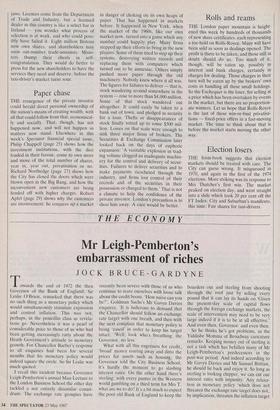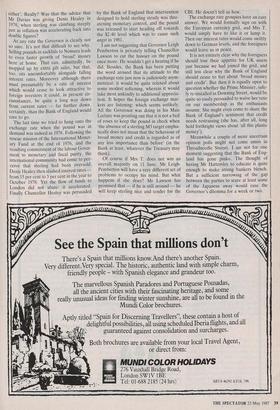THE ECONOMY
Mr Leigh-Pemberton's embarrassment of riches
JOCK BRUCE-GARDYNE
I recall this incident because Governor Leigh-Pemberton's annual Mais Lecture to the London Business School the other day tackled a not entirely dissimilar conun- drum. The exchange rate groupies have recently been severe with those of us who continue to scare ourselves with loose talk about the credit boom. 'How naive can you be?', Goldman Sachs's Mr Gavyn Davies enquires. 'It is ludicrous to demand that the Chancellor should follow an exchange rate target with one breath, and then with the next complain that monetary policy is being 'eased' in order to keep his target intact. 'Well, look who's breathing: the Governor, no less.
What with all this eagerness for credit, 'broad' money roaring away and ditto the prices for assets such as housing, the Governor told the City Business School, it's hardly the moment to go slashing interest rates. On the other hand there's sterling: with every punter in the Western world gambling on a third term for Mrs T. what are we to do? It's a bit much to expect the poor old Bank of England to keep the boarders out and sterling from shooting through the roof just by selling every pound that it can lay its hands on.'Given the present-day scale of capital flows through the foreign exchange markets, the scale of intervention may need to be very large indeed if it is to be at all effective.' And even then, Governor: and even then.
So he thinks he's got problems, as the Yiddishe Momma of Broadway caricature remarks. Keeping money out of sterling is not a task which has befallen many of Mr Leigh-Pemberton's predecessors in the post-war period. And indeed according to Mr Gavyn Davies and Mr Samuel Brittan, he should lie back and enjoy it. So long as sterling is looking chipper, we can cut our interest rates with impunity. Any relaxa- tion in monetary policy 'which does not threaten the exchange rate target does not, by implication, threaten the inflation target
either'. Really? Was that the advice that Mr Davies was giving Denis Healey in 1978, when sterling was climbing steeply just as inflation was accelerating back into double figures? At any rate the Governor is clearly not so sure. It's not that difficult to see why. Selling pounds in sackfuls to Nomura leads to even faster growth of 'broad' money here at home. That can, admittedly, be mopped up by extra gilt sales, but that, too, sits uncomfortably alongside falling Interest rates. Moreover although there must presumably be a rate of interest which would cease to look attractive to foreign investors it could, in present cir- cumstances, be quite a long way down from current rates — far further down, certainly, than the Bank of England would care to go. The last time we tried to hang onto the exchange rate when the pound was in demand was indeed in 1978. Following the rescue mission of the International Monet- ary Fund at the end of 1976, and the resulting commitment of the labour Gover- ment to monetary and fiscal purity, the international community had come to per- ceive that sterling had been oversold. Denis Healey then slashed interest rates from 15 per cent to 5 per cent in the year to October 1978. Yet the flow of funds to London did not abate: it accelerated. Finally Chancellor Healey was persuaded by the Bank of England that intervention designed to hold sterling steady was thre- atening monetary control, and the pound was released to start heading off towards the $2.40 level which was to cause such angst in 1981.
I am not suggesting that Governor Leigh Pemberton is privately telling Chancellor Lawson to cut the hawser on the pound once more. He wouldn't get a hearing if he did. Besides, the Bank has been putting the word around that its attitude to the exchange rate just now is judiciously asym- metrical: it would be quite relaxed about some modest softening, whereas it would take most unkindly to additional apprecia- tion. It hopes the foreign exchange mar- kets are listening: which seems unlikely. All the Governor was doing in his Mais Lecture was pointing out that it is not a bed of roses to keep the pound in check when `the absence of a sterling M3 target empha- tically does not mean that the behaviour of broad money and credit is regarded as of any less importance than before' (in the Bank at least, whatever the Treasury may think).
Of course if Mrs T. does not win an overall majority on 11 June, Mr Leigh- Pemberton will have a very different set of problems to occupy his mind. But what happens if she does? Mr Lawson has promised that — if he is still around — he will keep sterling nice and tender for the CBI. He doesn't tell us how.
The exchange rate groupies have an easy answer. We would formally sign on with the European currency grid, and Mrs T. would simply have to like it or lump it. Then our interest rates would come swiftly down to German levels, and the foreigners would leave us in peace.
It is not entirely clear why the foreigners should lose their appetite for UK assets just because we had joined the grid, and still less clear why the Bank of England should cease to fret about 'broad money and credit'. But then it is equally open to question whether the Prime Minister, safe- ly re-installed in Downing Street, would be quite so easily persuaded to waive her veto on our membership as the enthusiasts assume. She might even come to share the Bank of England's sentiment that credit needs restraining (she has, after all, long held forthright views about 'all this plastic money').
Meanwhile a couple of more uncertain opinion polls might not come amiss in Threadneedle Stsreet. I am not for one moment suggesting that the Bank of Eng- land has gone pinko. The thought of having Mr Hattersley to educate is quite enough to make strong bankers blench. But a sufficient narrowing of the gap between the parties to scare at least some of the Japanese away would ease the Governor's dilemma for a week or two.










































































 Previous page
Previous page